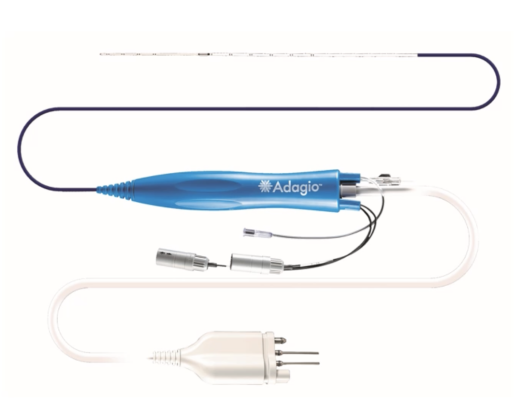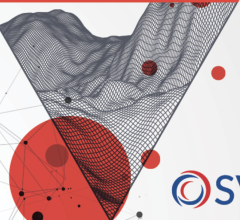
A new technology using ultralow temperature cryoablation (ULTC), developed by Adagio Medical, has eliminated clinical ventricular tachycardia (VT) in 94% of patients. The late-breaking science was presented this week during EHRA 2024, a scientific congress of the European Society of Cardiology (ESC) which took place April 7-9 in Berlin, Germany. Image courtesy: Adagio Medical
April 10, 2024 — A new technology using ultralow temperature cryoablation (ULTC) has eliminated clinical ventricular tachycardia (VT) in 94% of patients. The late-breaking science was presented this week during EHRA 2024, a scientific congress of the European Society of Cardiology (ESC)1 which took place April 7-9 in Berlin, Germany.
VT is a leading cause of sudden death in patients with heart failure and a reduced ejection fraction.2 Approximately 30% of patients with ischaemic and non-ischaemic cardiomyopathies develop ventricular arrhythmias including VT.3 Typical therapies to prevent VT include antiarrhythmic medication, such as amiodarone, and an implantable cardioverter-defibrillator (ICD).4
Principal investigator of the Cryocure-VT Trial Atul Verma, MD, of McGill University Health Centre in Montreal, Canada, offered this in a written statement issued by ESC on the late-breaking science: “Amiodarone suppresses VT but cannot eliminate it. In addition, the drug is associated with multiple serious side effects, which can lead to discontinuation in approximately 30-40% of patients.5 ICDs can successfully terminate VT with pacing or shocks, but the shocks are painful and are associated with increased mortality in the long-term. Ablation is an important option to eliminate VT but there have been no significant advancements in this therapy since the development of radiofrequency 15 to 20 years ago.”
Cryocure-VT Study Details
Cryocure-VT was a first-in-human clinical trial evaluating the safety and efficacy of ULTC for the treatment of recurrent monomorphic VTs in patients with ischaemic and non-ischaemic cardiomyopathies. ULTC is a new energy source which produces very deep lesions in ventricular tissue and penetrates scar – essential qualities for successful VT ablation. Current technologies like radiofrequency, noted the researchers, achieve limited tissue depth and cannot penetrate scar tissue.
“The novelty of this trial is the design of the catheter, which can deliver ULTC (down to -180 C) and produce lesions of different tissue depth depending on the duration of the freeze,” Verma. He added, “By estimating tissue depth, either from preprocedural or intraprocedural imaging, the operator can choose which depth is required to treat the VT and deliver the required duration of ULTC. This was the first study to investigate whether the technology could work in patients.”
Cryocure-VT was a single arm study conducted at nine centres in Belgium, Canada, Czechia, France, Germany, and the Netherlands. The study included 64 patients with a history of VT, an indication for ablation, a history of ischaemic or non-ischaemic cardiomyopathy, and an ICD already implanted or planned for implantation immediately after ablation. The mean age of participants was 67 years and three (4.7%) were women. All patients underwent the ablation procedure using the ULTC catheter and the operator’s choice of electroanatomical mapping system.
The primary endpoints were acute non-inducibility of clinical VTs at the end of the procedure, freedom from major adverse events at 30 days, freedom from any sustained VT (>30 seconds) at six months, and freedom from ICD intervention at six months.
Cryocure-VT Trial Outcomes
The primary acute effectiveness endpoint of non-inducibility of clinical VTs post-procedure occurred in 94% (n=51/54) of patients in whom post-ablation induction was attempted. All VTs were eliminated in 85% (n=46/54) of patients. There were no protocol-defined major adverse events at 30 days. There were four serious adverse events (6%), including one asymptomatic ventricular pseudoaneurysm, one small pericardial effusion which resolved without intervention, one small pericardial effusion which was drained, and one case of haemodynamic instability requiring extracorporeal membrane oxygenation (ECMO) support. One patient died of heart failure 26 weeks after the procedure.
At six months, 38 patients (60%; n=38/63) remained free of any sustained VT, and 51 patients (81%; n=51/63) remained free of ICD shocks.6 There were no significant differences between ischaemic and non-ischaemic cardiomyopathy patients.
“ULTC ablation of monomorphic VT was effective and relatively safe in patients with ischaemic and non-ischaemic cardiomyopathies,” said Verma, who added: “The success rates for this novel procedure were at least as good, if not better, than prior VT radiofrequency ablation trials. The complication rates were consistent with other VT ablation trials. This technology is promising and may be an important advance for VT ablation by allowing the targeting of deeper mid-myocardial, and even epicardial, substrates. More studies, including randomized trials using this device in patients with monomorphic VT, are needed.”
Adagio Medical, based in Laguna Hills, CA, developed the technology and funded the trial. Dr. Verma has been involved in the development of the catheter and has been an adviser to Adagio Medical. The Adagio Medical iCLAS Ultra-Low Temperature Cryoablation System is CE-Mark approved for treatment of atrial flutter, paroxysmal and persistent atrial fibrillation, and is currently under clinical evaluation in the USA (IDE # G180263). According to Adagio Medical: “iCLAS ultra-low temperature cryoablation (ULTC) system has been developed with the vision of bringing the durability of Cox-Maze procedure1 to percutaneous transcatheter treatment of atrial arrhythmias. ULTC technology utilizes -196˚C nitrogen flow to rapidly freeze myocardial tissue to form durable, contiguous, transmural lesions2. The data from multi-center European trial of ULTC showed 85% single-procedure freedom from AF at 12 months in persistent AF patients along with 1.5% rate of transient device-related complications3. In the U.S.A. iCLAS system is an investigational device, limited by Federal law to investigational use (IDE #G180623).”
References and notes
1The Cryocure-VT trial was presented during the session ‘Late-Breaking Science: ablation’ which took place on 8 April 2024.
2Packer M. What causes sudden death in patients with chronic heart failure and a reduced ejection fraction? Eur Heart J. 2020;41(18):1757-1763.
3Tan NY, Roger VL, Killian JM, et al. Ventricular arrhythmias among patients with advanced heart failure: A population-based study. J Am Heart Assoc. 2022;11(1):e023377.
4McDonagh TA, Metra M, Adamo M, et al. 2021 ESC Guidelines for the diagnosis and treatment of acute and chronic heart failure. Eur Heart J. 2021;42(36):3599-3726.
5Park HS, Kim YN. Adverse effects of long-term amiodarone therapy. Korean J Intern Med. 2014;29(5): 571-573.
6One patient withdrew consent for follow-up.
The European Heart Rhythm Association (EHRA) is a branch of the European Society of Cardiology (ESC) which aims to improve patients’ quality of life and reduce sudden cardiac death by limiting the impact of heart rhythm disturbances.
More information: www.escardio.org


 June 08, 2023
June 08, 2023 

